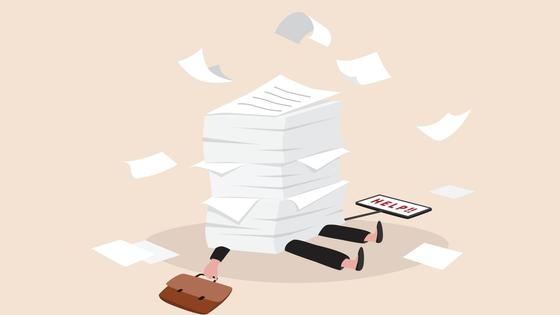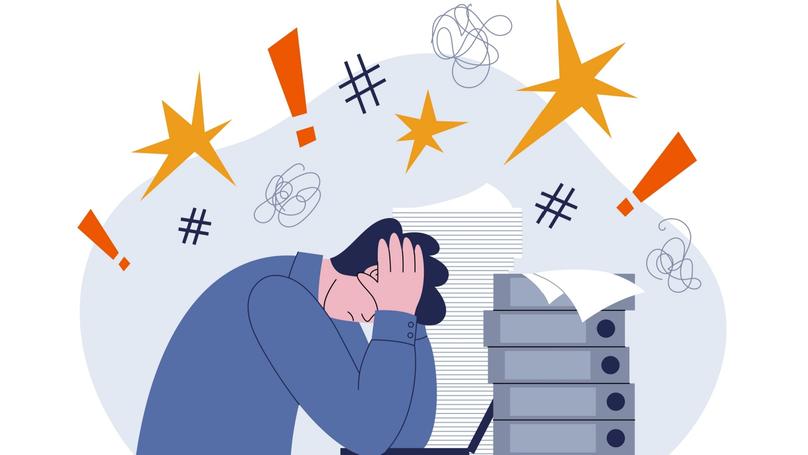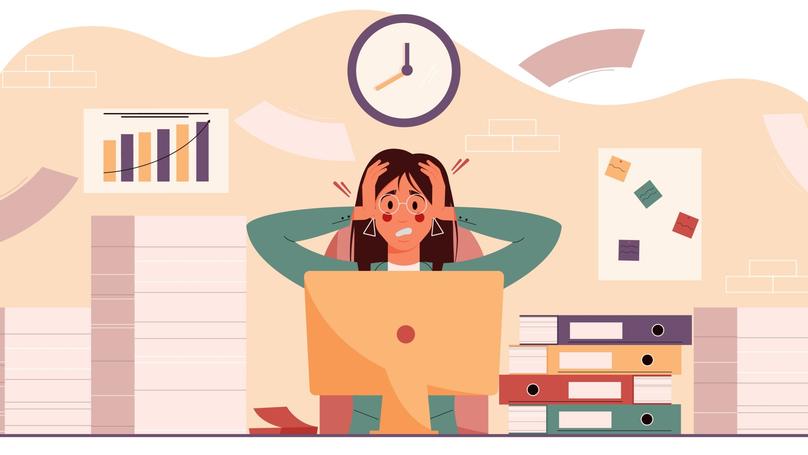How To Avoid Professional Burnout and Keep Your Passion for the Job
We face a lot of stress on a daily basis. In an effort to keep up with the rhythm of the modern world, people become obsessed with success, dreaming of a pay increase and working 24/7 to achieve it.

However, this lifestyle does not lead to new perspectives and promising careers, but to anxiety, insomnia, and apathy. More and more people complain that even their once much-loved job no longer brings joy and satisfaction. The reason for this is professional burnout. We found out what it is and how to avoid it.
What is professional burnout, and what factors trigger its manifestation?
Emotional burnout is a state of mental, physical and psychological exhaustion. Accordingly, professional burnout occurs due to chronic stress, first of all at work, which, in its turn, evolves due to high workloads, deadlines, unfair attitude of superiors and conflicts with colleagues.
This concept was first used in 1974 by the American psychiatrist Herbert Freudenberger, although in fact the emotional burnout syndrome is much older. It can be caused by a person's excessive empathy, low social activity, inequality in society and in a particular team, poor working conditions. Thus, professional burnout is observed in specialists of various professions and positions - from assistants and aides to heads of corporations. It is believed that accountants, doctors, teachers, lawyers, bank employees, i.e. employees of the human-to-human sphere experience burnout symptoms most often. In other words, those professions, which involve regular interaction with people, more frequently entail nervous overstrain. In addition, workaholics are more prone to professional burnout, as workaholism increases the risk of depression, anxiety, and sleep problems. The same goes for introverts who experience additional stress due to the difficulty in finding common ground with the team.
How do you know if it's burnout?
Of course, being tired does not always imply burnout. For example, if you came from work weary, but you managed to have a rest and woke up in the morning cheerful and full of energy, this is not burnout. Fatigue is always replaced by a burst of energy, and vice versa. Burnout is characterised by so much accumulated tiredness that you can't just get rid of it. A couple of hours of rest after a hard day's work does not help a person experiencing professional burnout, as it is not enough time for recovery.
The danger of this condition lies in the fact that the symptoms of burnout appear slowly and, generally, unnoticeably. The presence of this syndrome becomes obvious after you have stopped feeling joy from work and are looking for another excuse to skip a day. But if you listen to your body, pay attention to your feelings and physiological signals, you can notice signs of exhaustion at the very beginning. Physical symptoms of burnout include poor appetite, insomnia, frequent headaches, and digestive problems. Among emotional symptoms there may be anxiety, irritability, impaired concentration, low self-esteem, lack of motivation to do anything, and dissatisfaction with work and life in general. Physical and emotional manifestations of burnout also result in behavioural symptoms - withdrawal and a desire to self-isolate, procrastination and decreased productivity, possibly alcohol abuse.
Burnout prevention: how to protect yourself and keep your love for the job for a long time

In the last few years, large corporations and even small local companies have started to pay attention to the mental health of their employees, to teach them competent time management, and to offer courses on stress and anxiety management. We have come up with 10 main recommendations, following which you will be able to avoid burnout and work more productively without experiencing overstrain and discomfort.
-
Plan your working hours in advance
We have already found out that the main cause of professional burnout is excessive workload and too many responsibilities. To avoid panic from accumulated tasks and concerns, take a rational approach to time planning. Make a plan for the coming working week in advance, which will indicate which tasks should be done first, which ones should be done second, and so on. For each day of the working week, write a separate detailed to-do list with a deadline for each item. This will help you get more done without burning out and keep all tasks and your own emotions under control.
-
Take breaks while you are working
Every 2-3 hours, take a short rest break. These time-outs will allow you to be more focused and productive when you get back to work. This time, at least 5-10 minutes, will help you recover a little, "reboot" and be fully prepared to continue doing your job. The best way to distract yourself from work issues for a while and just switch off your thoughts is physical exercise, for example, a small warm-up, or a walk outdoors (maybe there is a nice square or park not far from your office or other place of work). By the way, it is useful to go out for short promenades not only in between work, but also just for fun. Clear your head regularly, a little fresh air never hurt anyone!
-
Avoid negative thoughts
At the end of the working day, remember the positive and pleasant moments, for example, how a colleague helped you out, your boss approved an idea, or a customer made you happy with a large purchase. In addition, it is essential to always remember the value of what you do, how you help people, and how you make the world a better place. Of course, if your work is directly related to helping people, such as being a doctor, firefighter or volunteer, it is much easier to do this. But even if your work does not bring such an obvious benefit to others, think about what you are doing for the benefit of your family. It is the realisation of the social importance and necessity of an activity that increases people's job satisfaction and makes them feel happier.
-
Talk to your colleagues more
It is important to maintain trusting relationships in the team. A healthy psychological climate, close-knit community, developed mutual support, help and respect contribute to increased productivity of all employees. Collective events and competent team building will help to counteract professional burnout - for example, offer your colleagues to celebrate the completion of a project, the closing of a major deal or even your birthday. Such informal communication will allow you to feel a sense of unity with others, belonging, and involvement in one big cause.
-
Practise mindfulness
You should pay attention to working on yourself and developing mindfulness. This is what is meant by mindfulness - the ability to perceive the environment and your own inner state objectively, as if from the outside, to reflect and analyse your thoughts, words, actions, as well as the actions of others. To develop mindfulness, try meditation. For example, mindful breathing. This meditation is aimed at achieving an inner harmony and cultivating centredness and deep focus. Sit comfortably, straighten your back, put your feet flat. It is better to switch off the phone in advance and make sure that you are not distracted by anything. Next, close your eyes, calm your breathing, and focus on your inhales and exhales. Breathe slowly, try not to think about anything. Even if thoughts and memories begin to appear spontaneously in your mind, try not to rush, but calmly "put them off" for later. The point is to restrain this impulse and not to lose focus on the breath. Another interesting meditation is "Raisin meditation". It entails the following: take a tiny raisin in your hand (in fact, it can be any object or thing of small size and pleasant texture), and then close your eyes and try to feel its shape and smell it. All your attention should be focused on just one raisin. This will also develop your concentration and calm you down. Regular meditation, which can be practised both at home and at work, will help you relax, "diffuse", gain inner strength and then look at any problem with fresh perspective.
-
Give up bad habits and addictions
Typically, people experiencing emotional burnout syndrome are addicted to additional stimulants. It can be coffee, sugar, fast food, alcohol or medical drugs, for example, sleeping pills or sedatives. But by doing so, we are not helping our own bodies, but rather depleting the nervous system. For example, caffeine increases the level of cortisol, the stress hormone. In the morning, it helps to gain energy, but if you drink coffee all day long, cortisol rises to unnaturally high levels, followed by anxiety, restlessness, and irritability. Therefore, it is important to gradually reduce the amount of such stimulants, and eventually abandon them altogether. Believe me, your performance will only improve!
-
Do sports
Instead of indulging in fast food and drinking litres of coffee, learn to manage your energy, emotions, and worries through physical activity. Of course, you don't have to go to the gym every day and tire yourself out on the machines. Exercise in moderation and only do what you really like. For example, you can easily unleash your resentment and anger at boxing training, calm down and concentrate at yoga, and "reboot" and gain a second breath in the swimming pool.
-
Get a hobby
It is good to distract yourself not only with physical activity, but also with your favourite hobbies. Find a hobby that stimulates your imagination and helps you take your mind off work. It can be painting pictures by numbers, knitting or embroidery, modelling clay or making some decorative objects, playing the guitar, cooking and so on. The point is that this activity should give you inner strength, inspire you and contribute to finding peace and harmony.
-
Make a list of things you don't like to do
Analyse all of your activities and all the tasks you do in and outside of work. Think about which of these take up the most of your resources and do not bring you any satisfaction or joy at all. Try to do less of these things, suggest to your boss that you take on a few other responsibilities instead of the ones that are throwing you off your game. Devote more energy and attention to the things that inspire and motivate you.
-
Don't neglect sleep
Sleep harmony is especially important for maintaining mental health. It is during sleep that our body accumulates energy, consolidates all the information received during the day into long-term memory and eliminates unnecessary information. Chronic sleep deprivation increases the risk of cardiovascular disease, as well as symptoms of depression, such as low mood and excessive anxiety.
Lectera’s Online Courses by topic
Lectera checklist: screen yourself for professional burnout

Getting rid of emotional burnout syndrome on your own is only possible if you recognise it at the earliest stage. We have prepared a special checklist for you, which can be used to determine whether you are prone to burnout. Tick the statements you agree with:
-
I started getting colds more often;
-
I'm having more and more distressing thoughts for no apparent reason;
-
I get easily irritated about anything;
-
I have no desire to socialise with other people or carry on conversations with colleagues;
-
After work, I want to be alone;
-
I feel like I'm not a good enough specialist and I'm about to be fired;
-
My work responsibilities are stressing me out a lot more than they used to;
-
I don't think my work is useful anymore;
-
I often divert myself from work by taking coffee breaks;
-
I feel like my colleagues are pushing their responsibilities onto me;
-
I want to take a break from the people around me;
-
I have recently become harsher towards colleagues and subordinates;
-
I find it harder every day to get up for work;
-
I feel tired first thing in the morning;
-
I often feel emotionally drained.
So, the more boxes you tick, the more likely it is that you too are susceptible to professional burnout. Use the above tips and observe your condition. The key is not to turn a blind eye to exhaustion, otherwise it can lead to more serious mental disorders. In addition, it is burnout that provokes the emergence of heart disease, diabetes, and hypertension and increases vulnerability to various other health problems. Therefore, you should not disregard the care of your mental well-being, this way you will protect yourself and improve the quality of your life. We wish you health, inner balance, and harmony!
Share this with your friends via:
Latest News

A significant stage in the development of the alternative education system has begun in West Northamptonshire in the UK: the County Council is actively calling on parents, guardians, and trustees to participate in shaping the future of this key area.

Outwoods Primary School in Atherstone, Warwickshire, having experienced deep sadness after the loss of their famous cat, Silla, has found solace in a new pet – a Maine Coon named Aloysius O’Hara.

In modern universities, artificial intelligence, and in particular ChatGPT, is rapidly transforming from a controversial tool into a full-fledged student assistant.

An innovative educational project is gaining momentum in UK primary schools, aiming to change attitudes towards video games.

The Massachusetts Institute of Technology (MIT) presents MIT Learn – a revolutionary online platform that opens a “new front door” to access university knowledge and resources.












 Test. Check Your Social Media Dependency Level!
Test. Check Your Social Media Dependency Level!
 Test: What Business is Right For You?
Test: What Business is Right For You?
 “I’m Here for the Long Haul”: When Loyalty to a Company Becomes Toxic
“I’m Here for the Long Haul”: When Loyalty to a Company Becomes Toxic
 Test: How Prone Are You to Abusive Behavior as a Manager?
Test: How Prone Are You to Abusive Behavior as a Manager?
 Test. What superpower would you possess if you were a superhero?
Test. What superpower would you possess if you were a superhero?
 Test. What Should You Let Go of Before Winter Ends?
Test. What Should You Let Go of Before Winter Ends?
